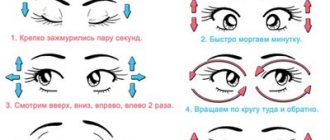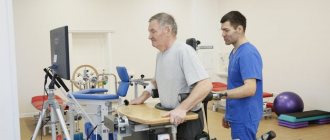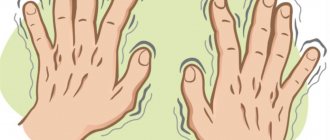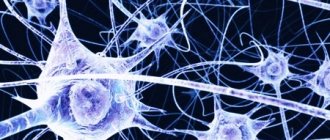The problem of stress and diseases arising from it is very relevant in modern medicine. Thus, chronic psycho-emotional stress is the cause of such common “diseases of civilization” as neuroses.
The incidence of neurotic disorders in developed countries reaches 10-20%, and the annual increase in their prevalence in the world is 10%.5 (c-1)
One of the main symptoms and at the same time the most important causes of the progression of neurosis are sleep disturbances, in particular insomnia.5 (ts-2) According to research, with neurotic disorders they are observed in 65-100% of cases.2 (ts-3) Often it is the bad sleep under stress, according to patients, leads to headaches, fatigue, increased anxiety, limited social activity and other manifestations of neurasthenia.1 (ts-4)
Why do you experience disrupted sleep?
Disturbed sleep occurs for a variety of reasons. In most cases, sleep disorders are related to the way a person lives, their sleep and sleep patterns, and their health. The most common causes of sleep disturbance are related to disruptive behavior, the use of medications, and work habits. For example, sleep deprivation in people who work routinely leads to an increased risk of diabetes and vaginal problems.
Before signs and symptoms of sleep disturbance, pay attention to:
- extreme daytime sleepiness;
- irregular breathing;
- increased laxity during sleep;
- irregular cycle of sleep and lack of sleep;
- Difficulties due to blues.
The broadest types of sleep disturbance include:
- insomnia, for which it is important to fall asleep or fall asleep during the night after waking up;
- sleep apnea, when a person suffers from intermittent breathing, which is often accompanied by snoring;
- restless legs syndrome (RLS), which causes unpleasant sounds and twisted legs when trying to fall asleep;
- narcolepsy is a condition characterized by severe drowsiness and rough sleep throughout the day (for example, during the day).
For prompt treatment to the doctor, most sleep disorders should be rejoiced (for example, seizures if you are in a dream). Some people may not notice problems with sleep for a long time and give up, not caring about those who sleep much less, less necessary. After about an hour, women and men become restless, sometimes sleep deprived, and signs of insomnia (excessive or restless sleep) appear.
Treatment of insomnia and vegetative dystonia
Symptoms of autonomic dystonia cease to bother the patient after complete recovery of the nervous system, which can take from several months to several years, depending on the degree of the disorder. However, practice shows that sleep problems are the first to leave the patient, and already on the third day of treatment, patients notice significant improvements in the quality of sleep.
The most effective method of restoring healthy sleep is complex laser therapy. Today, this is a unique technology that allows you to absolutely safely launch the body’s self-healing processes, normalize well-being, restore a surge of strength, restore good sleep, normalize blood pressure, hormonal levels, psycho-emotional state and other processes in the body.
“Laser therapy immediately relaxed me - I felt comfortable and could even fall asleep. In the first days of treatment, a mood appeared. In the morning, my head seemed clearer, and many tasks at work ceased to be difficult” - Yuri, patient of the Central Clinical Hospital.
Even one session of laser therapy leads to positive changes. However, the full course requires daily regularity with a gradual increase in the power of laser light exposure. This is the only way to achieve high and long-term results from the therapy.
At KCVN we use intravenous laser blood irradiation ILBI and low-intensity laser therapy LILI. Other methods of physiotherapy are no less effective in treating sleep problems. An integrated approach allows you to quickly (within 10 days) start the processes of self-healing of the nervous system.
Sleeplessness. Why should you be timid and fall asleep?
According to the American Academy of Medicine's ICSD-3 sleep survey, insomnia is identified as a persistent difficulty with sleep, difficulty or difficulty sleeping. Insomnia may have no potential factors and symptoms, and its diagnosis relies on two main components:
- sleep disturbances, which arise independently from the presence of sufficient capacity for normal sleep;
- daily disruptions are directly related to poor nutrition and poor sleep (stress, emotional outbursts).
A doctor can determine the causes and signs of sleep disturbance. Sleeplessness strikes:
- chronic, which is characterized by symptoms that occur at least three times a day, lasting at least three months;
- short-term, which is no less troubling, less than three months.
How to revel in sleeplessness? Due to insomnia, most diagnoses fall into two categories:
- difficulties due to sleep patterns such as these (most often it occurs in people whose daily rhythm of life is synchronized due to factors such as disrupted rhythms or an irregular work schedule);
- Difficulties with falling asleep after a person falls asleep unexpectedly and then wakes up (often occurs in older people, as well as in people who rely on alcohol, caffeine or YouTube before bedtime).
Many women and men experience a mixture of insomnia, which includes problems with both sleep and anxiety. People who suffer from chronic insomnia may experience symptoms of mixed insomnia. Over the years, the signs of sleeplessness may change.
Based on the diagnosis, the doctor selects treatment: taking medications, cognitive behavioral therapy, switching to a healthy way of living and eating habits.
People who suffer from insomnia need to:
- take a nap during the day, especially at the end of the day;
- Avoid drinking alcohol, caffeine and thyme sprouts in the evening;
- get used to the late intake of hedgehogs;
- go in for sports every day on a regular basis;
- Maintain a consistent sleep schedule that includes the same hour of sleep and wake-up every day.
What else can you do?
Genetics can also influence sleep patterns. Scientists have discovered that insomnia can be inherited. Researchers have also established a genetic link between insomnia and type II diabetes. Various DNA tests, including the Atlas Genetic Test, can analyze your genetic predisposition to insomnia.
There's also growing evidence that gut microbes can influence sleep quality. According to a 2019 study, having a more diverse microbiome (with different types of bacteria) is associated with better quality sleep. The diversity of the intestinal microbiota and other important parameters of a healthy intestine can be determined by the Atlas test.
Sources:
- NHS: Why lack of sleep is bad for your health – Sleep and tiredness
- NHS: How to get to sleep – Sleep and tiredness
- Tomas Chamorro-Premuzic, “How Much Is Bad Sleep Hurting Your Career?”, Harvard Business Review Home
- Kelly Glazer Baron et al., “Orthosomnia: Are Some Patients Taking the Quantified Self Too Far?”, 2017
- Dalva Poyares et al., “Fitness Tracker to Assess Sleep: Beyond the Market”, 2015
- Janna Mantua et al., “Reliability of Sleep Measures from Four Personal Health Monitoring Devices Compared to Research-Based Actigraphy and Polysomnography”, 2016
- Kathleen E. West et al., “Blue light from light-emitting diodes elicits a dose-dependent suppression of melatonin in humans,” 2011
- National Heart, Lung, and Blood Institute: Sleep Deprivation and Deficiency
- Mark R. Rosekind, “The Cost of Poor Sleep: Workplace Productivity Loss and Associated Costs,” 2010
- David S. Black et al., “Mindfulness Meditation and Improvement in Sleep Quality and Daytime Impairment Among Older Adults with Sleep Disturbances: A Randomized Clinical Trial,” 2015
- Kline, C, E., “The Bidirectional Relationship Between Exercise and Sleep: Implications for Exercise Adherence and Sleep Improvement,” 2014
- Yujiro Yamanaka et al., “Physical exercise accelerates reentrainment of human sleep-wake cycle but not of plasma melatonin rhythm to 8-h phase-advanced sleep schedule”, 2010
- Smith, R, P et al., “Gut Microbiome Diversity is Associated with Sleep Physiology in Humans”, 2019
- Stein, M, B et al., “Genome-Wide Analysis of Insomnia Disorder”, 2018
- Celia Vimont, “Should You Be Worried About Blue Light?”, 2021
How to interpret a dream as a neurosis?
To resolve restless, anxious or intermittent sleep due to neurosis, it is necessary to contact a neurologist. Insomnia is often associated with neurosis as a result of a number of psychological disorders (apathy, depression, anxiety, psychological trauma). Renewal of the sleep regime for aphid neurosis is based on medicinal therapy, which is based on the use of narcotic and sedative drugs. Some patients may be prescribed tranquilizers.
Also, treating insomnia for neurosis involves combating stress and using psychotherapeutic methods (group or individual therapy). The patient needs to avoid strong psychological pressures and worries, control emotions, and avoid depression.
What is more dangerous about chronic lack of sleep?
Periodic or persistent lack of sleep or disrupted sleep in children and adults threatens a host of health problems. Lack of sleep or insufficient sleep can lead to:
- low body resistance to respiratory illnesses;
- problems with the heart and vessels;
- disease of the thyroid gland and endocrine system;
- disruption of the exchange of speeches;
- decreased immunity.
The study concluded that those people who often do not sleep are more likely to experience depression, anxiety and paranoia, and those who do not sleep well.
What helps calm the nervous system?
If insomnia is blamed on neurosis, stress and other pathologies, it is necessary to calm the nervous system using other means, such as medicine. You cannot take drugs or other drugs without a prescription without a prescription. Self-destruction leads to disgusting self-esteem, the development of new illnesses.
Why does sleeplessness of a stationary nature occur? There may be many reasons for this problem and it is better to seek help from a doctor. In certain situations, people need comprehensive attention from a neurologist and psychologist.
Prevention of insomnia and sleep problems
There is no better prevention than a regular sleep and wakefulness schedule in accordance with the rhythms of nature and the human body. What other tips can we give for good sleep and a healthy nervous system? Fairly standard:
- You should fall asleep before 23:00, because it is at this time that the nervous system is set to relax and the hormone melatonin is produced.
- Do not eat heavy food at night, do not drink caffeine-containing drinks.
- During the day, spend more time outdoors and walking.
- Sleep in a ventilated area, in the dark (or wear a special sleep mask).
- Leave things for the morning, don’t waste your night’s sleep on something more “useful” or urgent. Better get up early and do all the necessary things in the morning. One of the modern theories of brain function says that the most productive time of work is from 5 to 8 am!
- You should not rely on the weekend and sleep on these two days for the whole week. It’s better to choose a single optimal sleep and wakefulness routine and follow it daily.
- If your sleep pattern is off, you can restore it with soothing herbal teas with honey, relaxation practices, or directly taking melatonin for a certain period of time necessary to restore the pattern, after which the medication must be stopped. For more detailed instructions, be sure to consult a neurologist.
If such methods no longer help you fall asleep peacefully at night and feel alert during the day, then it is necessary to undergo an examination of the ANS and, if a disorder of the autonomic nervous system is detected, undergo a course of treatment to restore its normal functioning.
What vitamins are needed to heal the nervous system?
To improve the nervous system in case of sleep problems, the doctor selects vitamin complexes, which include minerals, microelements and macroelements. Group B vitamins have a beneficial effect on the nervous system, which immediately improves balance and metabolic processes in the body.
The choice of vitamins depends on the diagnosis made by the doctor. For example, disturbed sleep during periods of stress leads to the use of complexes that replace folic acid, vitamins B1, B6, B9, C, as well as minerals (potassium, magnesium, saliva). Because neurosis and insomnia during pregnancy are to blame, women are not recommended to engage in sexual activities. Depending on the diagnosis of pregnancy, it is important to select antidepressants that are gentle on the fetus.
The difficulty of taking vitamins should be discussed with a doctor, especially for people who have been diagnosed with problems with the nervous system, as well as those who have problems with stress and heart problems.
0
1
1
Stat rating:
5 out of 5 based on 2 ratings
Author: Karaban Victoria Sergievna
Physician-neurologist. First category. Work experience over 15 years.
Causes of sleep problems
The range of reasons that cause sleep problems is, at first glance, wide. But what they all have in common is that this is stress, a problem that is not just psychological, but deeply physiological.
“Once I experienced a lot of stress - I mixed up the time and was late for the plane with two children in my arms. The situation is a thing of the past. But the panic that gripped me then has not left me to this day. It’s rare to fall asleep before 4-5 am, even if you go to bed long before that time. It happens that at 6 o’clock I wake up in a cold sweat, my heart is pounding furiously” - KCVN patient, Nadezhda.
Processes in the body as a whole are divided into two phases. The first phase is regulated by the sympathetic division of the autonomic nervous system. This is mobilization and activation: react! hit! run! etc. The second is the relaxation phase, when the activity of the sympathetic department is replaced by the parasympathetic and sets up the orgasm for rest and replenishment of reserves. When transitioning from one state to another, all processes in the body are rearranged: pulse, blood circulation, blood pressure, hormone production, etc. change.
When a person finds himself in stressful conditions, the nervous system can malfunction. The harmonious work of the sympathetic and parasympathetic departments is disrupted. As a result, the body suddenly mobilizes at night, and during the day, after a night of overexertion, it is no longer able to work actively.
“Before going to bed, I constantly had an anxious feeling, and I couldn’t sleep for a long time. During the night I woke up several times with the same feeling of anxiety. It happened that I woke up all wet from sweat and with a headache. And in the morning I had a stomach ache, chills, nausea, vomiting... This could last up to half an hour, but no more. And then during the day my psychological state was very bad: I was suspicious, sensitive, I constantly wanted to cry” - KCVN patient, Olesya.
This pathology is very clearly reflected by the study of heart rate variability. From the slightest load (the patient is asked to stand on his feet from a lying position), the pulse increases by more than 40 beats per minute, instead of the prescribed 20. After the load, the person lies down again, but his pulse does not calm down, and even intensifies, therefore there is no timely restructuring between the sympathetic and parasympathetic divisions.
In addition, with an artificial lack of sleep (night shifts, etc.), a deficiency in phase changes and insufficient inclusion of the rest phase occurs. This leads to insufficient replenishment of the body's reserves and insufficient recovery after daily activity. Hypersympathicotonia is formed, which leads to somatic complaints, fatigue syndrome, and a decrease in the effective response to stress even under minor loads.










